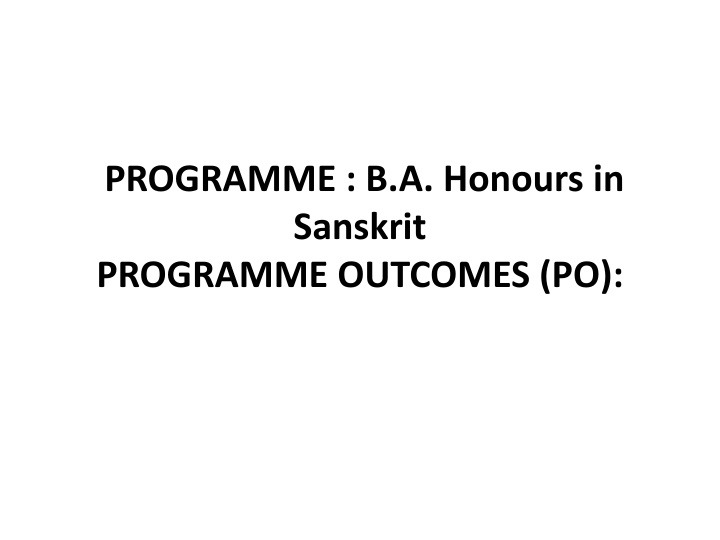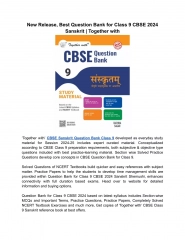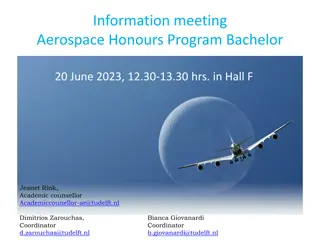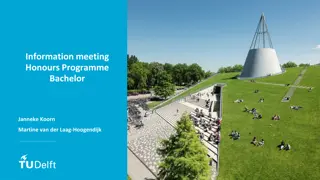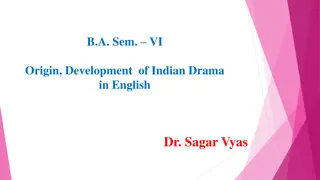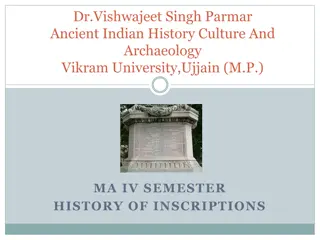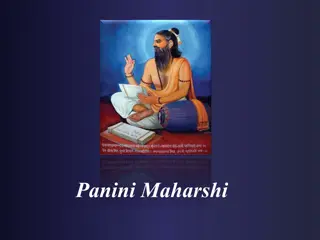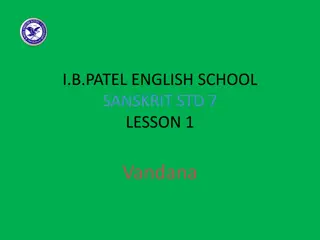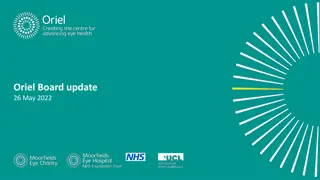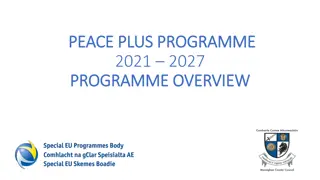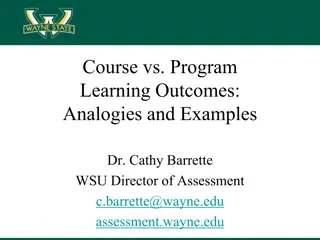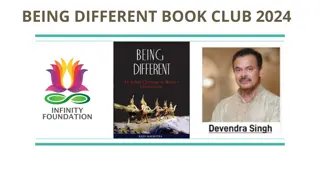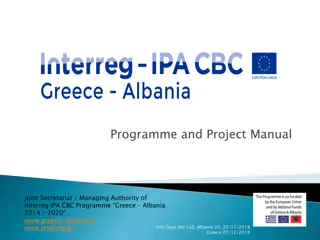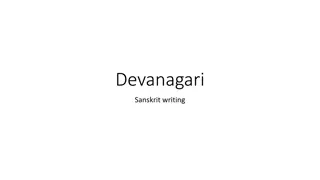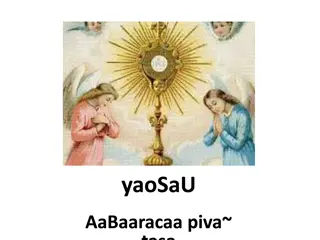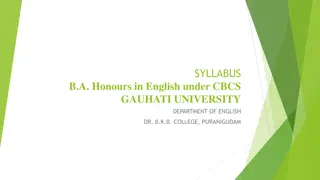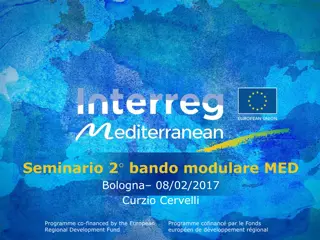B.A. Honours in Sanskrit - Programme and Outcomes
This B.A. Honours in Sanskrit programme focuses on introducing students to India's age-old heritage through the study of Sanskrit texts. The outcomes emphasize critical thinking, social interaction, effective citizenship, ethics, and self-directed learning. Students develop a strong understanding of ancient Indian history, culture, and literature while enhancing communication skills and analyzing Sanskrit texts. The interdisciplinary perspectives of Sanskrit language are explored, providing opportunities for career paths in fields like BPSC and UPSE.
Download Presentation

Please find below an Image/Link to download the presentation.
The content on the website is provided AS IS for your information and personal use only. It may not be sold, licensed, or shared on other websites without obtaining consent from the author.If you encounter any issues during the download, it is possible that the publisher has removed the file from their server.
You are allowed to download the files provided on this website for personal or commercial use, subject to the condition that they are used lawfully. All files are the property of their respective owners.
The content on the website is provided AS IS for your information and personal use only. It may not be sold, licensed, or shared on other websites without obtaining consent from the author.
E N D
Presentation Transcript
PROGRAMME : B.A. Honours in Sanskrit PROGRAMME OUTCOMES (PO):
PROGRAMME OUTCOMES (PO): > The Programme has enabled UG level students of Sanskrit to be introduced with Indian age-old heritage, accumulating in the last forty centuries, exercising inexpressible impact on the life and culture of the Indians with the explicit aim of inspiring as well as uplifting qualitatively each and everyone, directly or otherwise concerned with.
> PO1: Critical Thinking: Take informed actions after identifying the assumptions that frame our thinking and actions, checking out the degree to which these assumptions are accurate and valid, and looking at our ideas and decisions (intellectual, organizational, and personal) from different perspectives. >PO2: Social Interaction: Elicit views of others, mediate disagreements and help reach conclusions in group settings.
> PO3: Effective Citizenship: Demonstrate empathetic social concern and equity-centered national development, and the ability to act with an informed awareness of issues and participate in civic life through volunteering. >PO4: Ethics: Recognize different value systems including their own, understand the moral dimensions of their decisions, and accept responsibility for them. >PO5: Self-directed and Life-long Learning: Acquire the ability to engage in independent and life-long learning in the broadest context of socio-technological changes.
PROGRAMME SPECIFIC OUTCOMES (PSO): > Sanskrit is a very rich language of India. It is a medium to know about ancient Indian history, culture, religion, social life through its text. The academic programmes of Sanskrit Honours Courses are designed to enhance not only professional skill but also develop a deep understanding of rich heritage and dynamic prevalent scenario of India through various Sanskrit texts. > PSO1: Develop a strong concept of ancient Indian history, philosophy and literature.
>PSO2 : Enhance communication skills-Listening, Speaking, Reading, Writing. PSO3 : Practice of textual analysis of Sanskrit and Vedic Sanskrit texts endows them to develop a critical perspective to assess existing research through careful reading, analysis and discussion. PSO4 : Reasonable understanding of multi-disciplinary relevance of literature of Sanskrit like Veda, Philosophy, Grammar, Kavyashastra, Dharmshastra etc. >PSO5 : Create awareness about interdisciplinary perspectives of Sanskrit language. PSO6 : After graduation students can apply in the field of BPSC and UPSE.
Course Outcomes: Core Course: Semester - I Name of Paper (1016) : Classical Sanskrit Literature (Poetry) > CO1: Appreciate the development of Sanskrit Literature. CO2: Negotiate texts independently with grammatical analysis and poetic excellence. CO3: Acquainted with the work ; Raghuvamsa and Kumarsambhavam of the Great poet Kalidasa, Kiratarjuniam of Bharavi and Neetishatakam of Bhartrihari. CO4: Know about origin and development of different types of Mahakavya and Geetikavya.
Semester -I Name of Paper (1026) : Critical Survey of Sanskrit Literature. > CO1: The journey of Sanskrit literature from Vedic literature to Pura a. CO2: Special features of Sanskrit Puranas & original source of our cultural heritage. CO3: An outline of different shastric traditions of Vyakarana. General Introduction to Dar ana-Major schools of Indian Philosophy and Poetics- Six major Schools of Indian Poetics-Rasa, Ala k ra, R ti, Dhvani,Vakrokti and Auchitya. > CO4: The different genres of Sanskrit Literature like Ramayana and Mahabharata.
Semester -II Name of Paper (2016) : Classical Sanskrit Literature (Prose). CO1 : Students would be able to know the origin and development of Sanskrit Prose literature. CO2 : Know about important prose romances and fables of Sanskrit. > CO3 : They will be able to analysis compound formation. CO4 : The course also seeks to help students negotiate texts independently.
Semester - II Name of Paper(2026) : Self-Management in the G t > CO1: Cognitive and emotive apparatus. CO2: Philosophy of self-management in the G t through controlling the mind. > CO3: Self-management in the G t through devotion. CO4: Students negotiate the text independently without referring to the traditional commentaries so as to enable them to experience the richness of the text. er(2026) : Self-Management in the G t
Semester III Name of Paper : Classical Sanskrit Literature (Drama). > CO1: The inner structure of Sanskrit drama by themselves. CO2: The famous drama as Svapnavasavadattam of Bhasa, Abhigyanshakuntalam of Kalidasa and Mudrarakshas of Vishakhdutta with a view to giving knowledge of ancient Indian dramatic system. > CO3: These three most famous dramas of Sanskrit literature represent three stages in the growth of Sanskrit drama. > CO4: Origin and development of Sanskrit Drama.
Poetics and Literary Criticism (3026) : > CO1 : Sanskrit Poetics includes concepts like Shabd-shakti, rasa, kavya-guna, r ti, dhvani, etc. > CO2 : The entire domain of Sanskrit poetics such as definition of poetry and purpose of poetry. > CO3 : Divisions & functions of word and meaning. > CO4 : Ala k ra (figures of speech) and chandas (metre), etc.
Indian Social Institutions and Polity(3036) : > CO1: Origin and Development of Indian Polity. > CO2: Definition and scope of Social institutions. > CO3: Structure of ancient Indian society and Values of life and position of women in the ancient Indian society. > CO4: Various aspects of social institutions and Indian polity as propounded in the ancient Sanskrit texts such as Sa hit s, Mah bh rata, Pur a, Dharma- stra, Kau ilya'sArtha stra and Brihatsamhita of Varahamihir.
Semester IV Name of Paper : Indian Epigraphy, Palaeography and Chronology(4016) > CO1: This course aims to acquaint the students with the epigraphical journey in Sanskrit, the only source which directly reflects the society, politics, geography and economy of the time. > CO2: Study of selected inscriptions and knowledge of their styles and patterns. > CO3: General Introduction to Ancient Indian Chronology. > CO4: The course also seeks to help students to know the system of Dating the Inscriptions (Chronograms).
Modern Sanskrit Literature (4026) : > CO1: The rich & profound tradition of modern creative writing in Sanskrit, enriched by new genres of writing. > CO2: Modern Sanskrit Drama. > CO3: Modern Sanskrit Gadya Kavya. > CO4: General survey of Modern writers and poets.
Sanskrit and World Literature (4036) : > CO1: Spread & influence of Sanskrit literature and culture through the ages in various parts of the world in medieval & modern times. > CO2: Upani ads and G t in World Literature. > CO3: R m ya a and Mah bh rata in South East Asian Countries. > CO4: K lid sa s Literature in World Literature and Sanskrit Studies across the World.
Semester V : Name of Paper : Vedic Literature (5016) > CO1: Various types of vedic texts. > CO2: Sa hit and Br hma a. > CO3: Vedic Grammar. > CO3: Upani ad, namely, Kathha, where primary Ved nta-view is propounded.
Sanskrit Grammar(5026): > CO1: The system of Traditional grammar. > CO2: Sanskrit vocabulary and grammatical construction. > CO3: Sangya Prakarana, Sandhi Prakarana and Kritya Prakarana according to Laghusiddhantkaumadi. > CO4: Procedures of formation of Sanskrit words.
Semester VI Name of Paper : Indian Ontology and Epistemology(6016) > CO1: It introduces students with Essentials of Indian Philosophy. > CO2: Cardinal principles of the Ny ya-Vai e ika philosophy through the Tarkasa graha. > CO3: To enable students to handle philosophical texts in Sanskrit. > CO4: It also intends to give them an understanding of essential aspects of Indian Philosophy.
Name of Paper : Sanskrit Composition and Communication(6026) > CO1: Capacity for creative writing and literary appreciation will be developed. > CO2: Students would be able to learn composition and other related information based on Laghu Siddhantakaumudi Vibhaktyartha Prakarana. > CO3: Students would be able to write an essay in Sanskrit, & their language-skill will be developed. > CO4: Students will able to learn the skills needed to participate in conversation that builds knowledge collaboratively.
